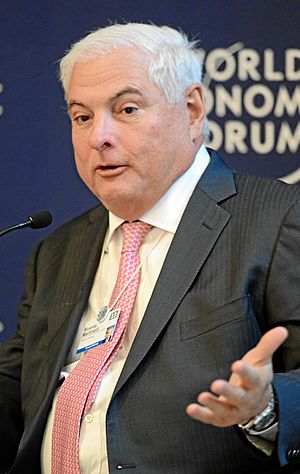Ricardo Martinelli facts for kids
Quick facts for kids
Ricardo Martinelli
|
|
|---|---|

Martinelli in 2013
|
|
| 36th President of Panama | |
| In office 1 July 2009 – 1 July 2014 |
|
| Vice President | Juan Carlos Varela |
| Preceded by | Martín Torrijos |
| Succeeded by | Juan Carlos Varela |
| Personal details | |
| Born |
Ricardo Alberto Martinelli Berrocal
11 March 1951 Panama City, Panama |
| Political party | Democratic Change (until 2020) Realizing Goals (2021–present) |
| Spouse | Marta Linares (1978–present) |
| Alma mater | University of Arkansas (BSBA) |
| Religion | Roman Catholicism |
Ricardo Alberto Martinelli Berrocal (born March 11, 1951) is a Panamanian businessman and politician. He served as the 36th President of Panama from 2009 to 2014.
After his presidency, Martinelli faced legal troubles. In 2024, he was sentenced to ten years in prison for using government money for personal reasons.
Contents
Early Life and Education
Ricardo Martinelli was born in Panama City, Panama. His father had Italian roots, and his mother had Spanish roots. For his high school education, he went to Staunton Military Academy in Virginia, in the United States.
In 1973, he earned a degree in business administration from the University of Arkansas.
Career in Business
Martinelli started his career working at a bank. Later, he became a successful entrepreneur, buying and starting several companies. He was best known as the owner of Super 99, a popular supermarket chain in Panama.
Many people admired his business skills. When he ran for president, some voters hoped he would run the country as well as he ran his businesses.
Entering Politics
Martinelli began his political career in the 1990s. He served as the Director of Social Security from 1994 to 1996. Later, from 1999 to 2003, he was the chairman of the board for the Panama Canal.
In 1998, he started his own political party called Democratic Change. He ran for president in 2004 but did not win.
He ran for president again in the 2009 election. This time, he promised to fight crime and make the government more honest. He formed a team with other political parties, and his running mate for vice president was Juan Carlos Varela.
On May 3, 2009, Martinelli won the election with over 60% of the vote. It was one of the biggest victories in Panama's history. He became president on July 1, 2009.
Presidency (2009–2014)
As president, Martinelli focused on growing Panama's economy and improving life for its citizens.
A Booming Economy
Under Martinelli, Panama's economy grew very fast. In fact, it had one of the highest growth rates in Latin America. This economic boom helped many people. The number of people without jobs went down.
The government also created programs to help people in need. These included a $100 monthly payment for the elderly and help for students to buy school supplies. The minimum wage was also raised, becoming the highest in Latin America at the time.
Building a Modern Panama
Martinelli's government invested billions of dollars in infrastructure projects. These projects were meant to make Panama a major center for global trade and travel.
Some of the key projects included:
- Building new roads, hospitals, and schools.
- Starting the expansion of the Panama Canal, a project that his predecessor had begun.
- Constructing the Panama City Metro, the first subway system in Central America.
These projects helped create jobs and modernize the country. However, they also increased the country's public debt.
Making Business Easier
Martinelli worked to make Panama a better place for business. His government passed a new tax law that simplified the tax system. He also finalized the Panama–United States Trade Promotion Agreement, a trade deal with the United States that made it easier for the two countries to do business together.
These policies helped attract more foreign companies and money to Panama.
Reputation and Criticisms
During his time in office, President Martinelli was very popular. At one point, his approval rating was over 90%, one of the highest in the world for a leader. Even when he left office in 2014, about 65% of Panamanians approved of his job as president.
However, he also faced criticism. Some people worried that he was trying to gain too much power. For example, the U.S. Ambassador to Panama at the time wrote that Martinelli had a "bullying style" and "autocratic tendencies."
Honors and Awards
Martinelli has received several awards from different countries and organizations.
- In 2010, the University of Arkansas created a scholarship in his name for students from Panama.
- In 2013, the Food and Agriculture Organization of the United Nations (FAO) recognized him for helping to reduce child malnutrition in Panama.
He has also received high honors from countries like France, Peru, and Portugal.
 France:
France:
 Grand Cross of the National Order of the Legion of Honour (July 14, 2013)
Grand Cross of the National Order of the Legion of Honour (July 14, 2013)
 Haiti:
Haiti:
 Peru:
Peru:
 Portugal:
Portugal:
 Grand Collar of the Order of Prince Henry, Portugal (July 29, 2013)
Grand Collar of the Order of Prince Henry, Portugal (July 29, 2013)
 Royal House of Bourbon-Two Sicilies:
Royal House of Bourbon-Two Sicilies:
 Taiwan:
Taiwan:
Personal Life
In 1978, Martinelli married Marta Linares. They have three children: Ricardo, Luis Enrique, and Carolina.
See also
 In Spanish: Ricardo Martinelli para niños
In Spanish: Ricardo Martinelli para niños

